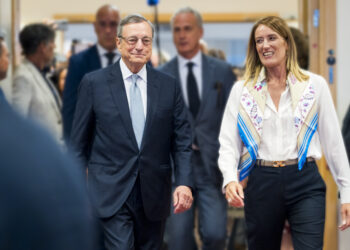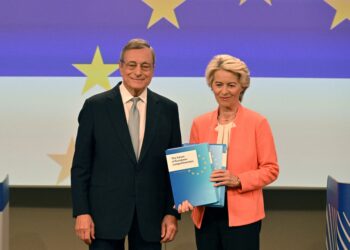From the correspondent in Strasbourg – Draghi’s report is an excellent contribution and a starting point. The European Parliament is listening to what the former prime minister and former head of the ECB has to say, knowing that he can play a leading role in the new legislature. The so-called ‘Ursula majority’ welcomes it, hinting that it should not be regarded as “the bible” of the new cycle, but Populars (EPP), Socialists (S&D), Liberals (RE) and even Greens are not failing to appreciate and support what represents the working basis for the next five years.
With appropriate distinctions, all major groups appreciate the work. In words, the Parliament says it is ready to work. Socialists insist on workers’ protection but, above all, on a change of pace. More Europe is needed, says Mohammed Chahim, because “no member state can do it alone,” and “we need to cooperate.” Although the challenge is not easy, since “there is a massive transition to be made without having the resources,” acknowledges Gabrielle Bischoff, who on behalf of the Socialists says she is willing to “support the need for investment” and, consequently, Draghi’s call for finding it also through common debt instruments.
But it is here that the Parliament’s debate touches probably the most sore point in the recipe offered by Draghi for a new twelve-star course. Sources close to the dossier assure that if there is one way, only one way, to scuttle the competitiveness report, it is to discuss only money, the money that is not there and the money that needs to be found. Jean-Paul Garraud, a French member of the Rassemblement National and a member of the Patriots for Europe group, puts it bluntly: “The Draghi report calls for billions that we don’t have and expenses that will be passed on to future generations.” While Alexander Sell (AFD/ENS), makes it clear that “we do not want new common debt,” and that “Germany will not pay for the debt of others.” Two “lone voices” because they are an expression of the opposition, of that extreme, Euroskeptic right wing to which the President of the European Commission and the allies have closed the doors to any form of political collaboration.
The less Euro-enthusiastic opposition, not only to Draghi and his report, touches on the main crux of the real challenge. Germany has traditionally had an austere stance, devoted to austerity of accounts, disinclined to debt mutualization instruments. It was not during the Merkel era; it was under Olaf Scholz only because of the crisis produced by the COVID-19 pandemic, which was exceptional in every respect, including breaking the Eurobond taboo. A precedent to which Berlin has attached a stipulation: no new Recovery Fund-style instruments until the one in use proves that it is credible and that resources are not misused.
Socialists, however, insist. “The Draghi report talks about policies, and we, politicians, should not be afraid,” stresses Nicola Zingaretti, head of the PD delegation in Strasbourg. Bas Eickut of the Greens echoes him: “Draghi is giving us examples to follow and solutions.” Hence the call to roll up the sleeves that comes from the liberal benches. “The Draghi report may not be perfect, but we can always change it; in any case, it should be our guide for the work we must do,” stresses Jao Cotrim de Figueiredo (RE).
This is where the welding of socialists-liberals-greens with populars is recorded. “The Draghi report will be a basis for the work of our next five years,” confirms EPP group leader Manfred Weber. He, too, calls for courage because, he warns, “there is no future without change.” However, Weber shifts the debate’s focus beyond Parliament, bringing it to the states’ representative institution. “We need to shake up the Council” of the EU, and he is right because it is mainly here that the whole game will be decided. This concept was also repeated by Markus Ferber, who is also a popular. “Draghi’s report identifies our situation, but we have no problem understanding where we are. We have problems implementing solutions. But not here in the Council.”
The political knot is of choices, and in the EPP, the choices come through regulatory change. Simplification, business-friendly measures and legal frameworks are called for. A paradigm shift that could mean, depending on how one decides to decline it, revising the Green Deal rules. In the Draghi report, there is a glimpse of the glimmer and the opportunity to reshape those green and innovative regulations to business-friendly competitiveness. A vision that matches that of conservatives: “We want growth, reduced burdens on business, and less bureaucracy,” chimes Nicola Procaccini, co-chair of the ECR Group and head of the Fratelli d’Italia delegation.
The words of Procaccini show a PPE-ECR rapprochement that will not please the socialists, liberals, and greens, who, to support the new von der Leyen Commission, have made it a condition not to work with the extreme right in Parliament. For now, the Draghi report is there and enjoys support, even broad support. But it will be nevertheless put to the test.
English version by the Translation Service of Withub![Mario Draghi nell'Aula del Parlamento europeo [Strasburgo, 17 settembre 2024]](https://staging.eunews.it/wp-content/uploads/2024/09/draghi-240917-750x375.png)







